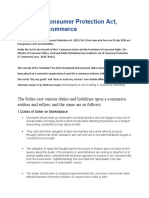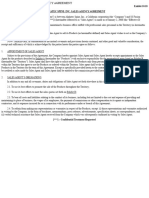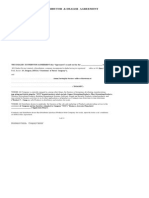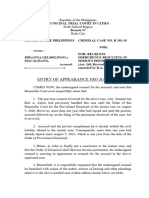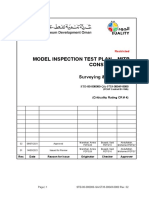FDSA - Proposed - Guidelines 2.0
FDSA - Proposed - Guidelines 2.0
Uploaded by
Trainmylife NetwarkCopyright:
Available Formats
FDSA - Proposed - Guidelines 2.0
FDSA - Proposed - Guidelines 2.0
Uploaded by
Trainmylife NetwarkOriginal Description:
Original Title
Copyright
Available Formats
Share this document
Did you find this document useful?
Is this content inappropriate?
Copyright:
Available Formats
FDSA - Proposed - Guidelines 2.0
FDSA - Proposed - Guidelines 2.0
Uploaded by
Trainmylife NetwarkCopyright:
Available Formats
FDSA – Proposed Guidelines for Direct selling Business
Introduction
Federation of Direct Selling Association (FDSA) is a voluntary social organization formed with an
intention to look into the activities of all genuine Direct Selling / Direct Marketing / Network
Marketing companies in India and to guide them in establishing legitimate and ethical business
practices. The Association is able to muster good support from several genuine Direct
Marketing companies pan India. Hence, it has become imminent to have a uniform code of
conduct, ethical business practices and guidelines to all member companies of FDSA.
Pursuant to the above, FDSA formulated certain guidelines to regulate the sale of goods and
services in Direct Marketing, Direct Selling or Network Marketing and to provide protection to
the consumer who purchase goods & services from the Direct Seller / Direct Marketing /
Network Marketer.
The following guidelines are formed by FDSA in the best interest of the Direct Selling /
Network Marketing industry in India, where either the company or the distributor will not
face any losses. In addition, The Govt. will also get huge revenues in the form of various
taxes.
I. Definitions:
1. Direct Selling
Direct selling means marketing or sales of goods or service directly to the end user / consumer
using word of mouth publicity, display and/or demonstrations of the goods or services, and / or
distribution of pamphlets.
2. Direct Selling Entity
Direct selling Entity means a business entity as recognized by law for the time being in force
including but not limited to a company duly incorporated under the Indian Companies Act, a
registered Partner Ship Firm, constituted under the Indian Partnership Act, Co-Operative society
registered under the Co-operative Societies Act, however shall not include Proprietary concern and
HUF, that engages /engaged in the business of direct selling.
FDSA – Draft Guidelines Version 2.0 Page 1 / 6
3. Direct Seller
Direct seller means a person who is authorised by the Direct Selling Entity to engage into the
business of Direct Selling.
4. Consumer
An individual who buys goods or services for personal use and not for manufacture or resale and
shall have the same meaning as provided under the Consumer Protection Act, 1986.
5. Distributor
A person who is engaged in the business of promoting or conducting direct selling by self or
through Direct Seller/s is called a Distributor.
6. Distributionship
Means the authentication/License granted by the Direct selling entity to an eligible applicant to
engage in the business of Direct selling as Distributor.
7. Goods or Services
Goods or Services shall have the same meaning as defined in the Sale of Goods Act and section
3(26) of the General Clauses Act, 1897, that is, it shall include every kind of movable property or
service other than actionable claims and money.
8. Sale
'Sale' means any transfer of property in goods or services for cash or deferred payment
or other valuable consideration, including a transfer of property in goods or services
involved in the execution of a contract, but does not include a mortgage, hypothecation,
charge or pledge. Explanation I.-A transfer of goods on hire- purchase or other
installment system of payment shall, notwithstanding that the seller retains a title to
any goods as security for payment of the price, be deemed to be a sale.
9. Sales Commission
Sale Commission means compensation payable to the direct seller/Distributor for
effecting sale of goods or services as stipulated herein by whatever name it is called.
II. Conditions for Permissible Direct Selling
a. Should be a Direct Selling Entity, having sales tax / Vat, Income Tax, TDS, Service
Tax and Shops and Establishment registration and other license as may be
required as per the law and regulations of its principle place of business.
FDSA – Draft Guidelines Version 2.0 Page 2 / 6
b. Partnership Deed or Memorandum of Association or bye-laws as the case may
be should clearly state their nature of business as direct selling. (Those who do
not have such specific clauses should get their memorandum of Association or
Partnership Deed as the case may be amended within 2 months from the date of
publication of these Guide lines)
c. The Direct Selling Entities should maintain websites with complete details of
their products and/or services, terms and conditions, details of direct selling and
all relevant information about the company and business in detail. The websites
shall be updated regularly and shall furnish all necessary information as required
by any law or regulations/guidelines as applicable.
d. Shall pay sales commission at the agreed rate within the agreed period as per
the terms stipulated in the distribution/direct seller appointment agreement, on
the sales affected directly by direct seller/distributor or through his team.
e. Shall give facility to verify the authenticity of the Direct seller / Distributor
through the official website on furnishing the Unique Identification number of
the Direct Seller/Distributor.
f. Should have a consumer grievance cell that endeavor redressal of consumer
grievances within 7 days from the date of making such complaints. Direct Selling
Entity shall maintain a consumer Complaint Register and shall record the
complaints, settlement/outcome. Such register shall made available for
inspection as and when required by the FDSA .
g. Website shall have provision for registering consumer complaints.
h. The Direct selling entity shall provide Photo Identity Cards to the Direct
Seller/Distributors and Direct Seller/Distributor shall visibly display the identity
card at the time of soliciting the sales.
FDSA – Draft Guidelines Version 2.0 Page 3 / 6
III. Appointments/Authorisations:
a. Direct Selling Entity shall enter into an agreement for appointment only after
scrutinizing the application of the intending person in a prescribed format with
necessary supporting documents such as;
i. Photo ID card
j. Address Proof
k. PAN Card
l. Other certificates
b. An agreement recording terms of such appointment should be executed
between the Direct Selling Entity and distributor/direct seller.
c. No application should be considered unless such applicant is attained the age of
majority under the Indian Contract Act to enter into an Agreement.
d. Each Direct Seller/Distributor shall be allotted Unique Identification Numbers
and Photo Identity Card upon granting license / permission to start direct selling.
IV. Prohibitions:
a. Shall not allot more than one Distributor ship to a single individual/entity.
b. Shall not pay sales commission unrelated to their respective sales volume.
c. Shall not sell goods or services with the knowledge that such goods or services are
inferior or exceeded its validity period as per the manufacturer or service provider.
V. General Conditions:
a. Packages of the Goods sold by the Direct Selling Entity should display details under the
weights and measurements Act like
i. Name and address of the Manufacturer / importer
ii. Name and address of the marketing company
iii. Year and month of Manufacturing / import
iv. Expiry date in case of consumables
v. Content, quantity
vi. MRP
vii. Customer care number and Address
FDSA – Draft Guidelines Version 2.0 Page 4 / 6
b. No sale should be affected by the Direct Selling entity on accepting “cash”. All sales and
consideration for direct sale transaction should be effected through bank.
c. Accounts of individual distributor shall be maintained properly and should be made
available through World Wide Web and/or printed form to be sent periodically to the
respective distributor/direct seller
d. Sales commission should be distributed to the respective Distributors on or before the
agreed date of settlement as per the terms of appointment as distributor/direct seller .
e. No sale shall be affected unless obtained an order form duly signed by the prospective
consumer.
f. “Goods sold by the Direct Selling entity should carry guaranty / warranty of the
manufacturer. However consumer should be given opportunity to exchange/return the
goods if finds any manufacturing defect or the product purchased is not useful for the
purpose it was meant, within 7 days from the date of purchase.
VI. Compensation plan:
There is no specific frame to control the model of compensation system but it is mandatory to
follow the below:
1. The Opportunity should be subjected solicitation.
2. Companies opting for registration / renewal fee should not offer any benefits /
commissions on the registration charges.
3. The compensation system / business model should offer commissions / benefits based
only on sale volumes. Any kind of returns on investment, fixed returns, interests,
periodical returns are not permitted under Direct Selling business.
4. The compensations system / business model should have proven arithmetic
propositions.
5. The compensation system should also have scope to achieve commissions by the
distributors even without any down-line (Self purchase or own sponsored consumer
sales).
6. A Distributor should be allowed to operate only on a single ID or position in the
compensation system.
FDSA – Draft Guidelines Version 2.0 Page 5 / 6
VII. General Business Ethics / Code of conduct:
Every Direct Selling Company should specify general business ethics / code of conduct
applicable for every distributor.
VIII. Information Readiness (Ready information file):
1. Every Direct Selling Company should maintain a file with all relevant documents that
include:
a. Certificate issued by Registrar Of Companies and MOA.
b. Xerox copies of TIN, DIN of Directors, TAN, PAN.
c. Certificate of Sales Tax, Service Tax, CST Registrations.
d. Copies of all Sales Tax Returns filed with the authorities.
e. Copies of Service Tax Returns filed with the authorities.
f. Copies of IT Returns of company filed with the authorities.
g. TDS Statements of Distributors and respective challans paid.
2. Every Direct Selling Company should maintain KYC / KYD (Know Your Customer / Know Your
Distributor) as a mandatory process. Specific formats are to be provided on their websites
to be available for all at any time.
IX. Grievance Redressal Mechanism:
Every Direct Selling Company must have a complaint redressal mechanism to address any
problem of their customers / distributors.
The business activities not complying with the above guidelines will
not be considered as Direct Selling / Direct Marketing and would be
dealt appropriately through FDSA policy of self-policing with the
concerned authorities.
* * *
Note: The FDSA is ready to accept any required modifications to suite as per law.
FDSA – Draft Guidelines Version 2.0 Page 6 / 6
You might also like
- AgentCommissionAgreement 3Document11 pagesAgentCommissionAgreement 3Katrizia Fauni100% (3)
- Channel Partner AgreementDocument13 pagesChannel Partner AgreementRaghava PutraNo ratings yet
- Seller Agreement - Big BasketDocument9 pagesSeller Agreement - Big BasketIshan Gaurav50% (2)
- Sales Agency AgreementDocument7 pagesSales Agency AgreementsabbiNo ratings yet
- Individual Distributor Agreement - India (Final) V1 WebDocument11 pagesIndividual Distributor Agreement - India (Final) V1 WebFahïma MannanNo ratings yet
- Sample Vendor Service AgreementDocument9 pagesSample Vendor Service AgreementAdrian KeysNo ratings yet
- Direct Seller AgreementDocument6 pagesDirect Seller Agreementlalit carpenterNo ratings yet
- AgreementDocument17 pagesAgreementteam.sunedgewellbeingNo ratings yet
- Vbo ContractDocument16 pagesVbo ContractNeeraj SharmaNo ratings yet
- Direct Selling Guidelines FinalDocument13 pagesDirect Selling Guidelines FinalJitu MoniNo ratings yet
- Advisory To State Governments or Union TerritoriesDocument5 pagesAdvisory To State Governments or Union TerritoriesUday SadamNo ratings yet
- Sample of Contract With Direct SellersDocument11 pagesSample of Contract With Direct SellersUday JhariyaNo ratings yet
- Contract With Direct Sellers/Distributors Agreement: Mr. MAM CHAND RAIPURIYA Hereinafter Called Company WhichDocument19 pagesContract With Direct Sellers/Distributors Agreement: Mr. MAM CHAND RAIPURIYA Hereinafter Called Company WhichVinay JangidNo ratings yet
- 5PDFDocument21 pages5PDFkajal.das.coNo ratings yet
- RCM Terms and Conditions - Wef 1 Nov, 2012Document3 pagesRCM Terms and Conditions - Wef 1 Nov, 2012Samir K MishraNo ratings yet
- Direct Selling ProformaDocument6 pagesDirect Selling ProformaJitu MoniNo ratings yet
- WeSafe BRAND PARTNER APPLICATION FORMDocument11 pagesWeSafe BRAND PARTNER APPLICATION FORM231976No ratings yet
- Guidelines For Starting An MLM Business in IndiaDocument2 pagesGuidelines For Starting An MLM Business in IndiafordulastaNo ratings yet
- Impact of Consumer Protection Act, 2019 On E-CommerceDocument3 pagesImpact of Consumer Protection Act, 2019 On E-CommerceVidhatri DeoliNo ratings yet
- Agreement TemplateDocument24 pagesAgreement Templatesolo.banda95No ratings yet
- Distributor Proposal FormDocument7 pagesDistributor Proposal FormSanthosh BalanNo ratings yet
- Demart Contract Final06OCTDocument11 pagesDemart Contract Final06OCTIrwin !No ratings yet
- WarrantyDocument15 pagesWarrantybeatrixe CalpoNo ratings yet
- Direct Seller Agreement 2023Document11 pagesDirect Seller Agreement 2023puneetsonwani3No ratings yet
- Direct Selling Guidelines 2016Document2 pagesDirect Selling Guidelines 2016nirajNo ratings yet
- Ateneo Reviewer in Comm LawDocument368 pagesAteneo Reviewer in Comm LawdecemberssyNo ratings yet
- My Office _ Atomy India (1)Document8 pagesMy Office _ Atomy India (1)obaidullahnizami860No ratings yet
- Sale Agency AgreementDocument15 pagesSale Agency AgreementNataliya Lemets100% (1)
- Session-7 CPActDocument40 pagesSession-7 CPActShivangi BhasinNo ratings yet
- 4JyG8INsN3 Social Media Marketing AgreementDocument9 pages4JyG8INsN3 Social Media Marketing Agreementtayyab iqbalNo ratings yet
- bs_cer_9514108Document12 pagesbs_cer_9514108Alok BeheraNo ratings yet
- PanelDocument26 pagesPanelrp4141295No ratings yet
- Commerce MADocument138 pagesCommerce MATruce SalvadorNo ratings yet
- Herald Dealer Agreement DRAFT (N)Document6 pagesHerald Dealer Agreement DRAFT (N)himpropertiesblpNo ratings yet
- Merchant Application Form NewDocument2 pagesMerchant Application Form NewALPHA COLLO100% (1)
- QNET Vihaan P&P 12 Jan 2022 (Clean)Document27 pagesQNET Vihaan P&P 12 Jan 2022 (Clean)Lakshita SharmaNo ratings yet
- Draft E-Commerce Rules 2019Document4 pagesDraft E-Commerce Rules 2019SachinShingoteNo ratings yet
- AGREEMENT of Yadadri Bhongiri 400 PlotsDocument13 pagesAGREEMENT of Yadadri Bhongiri 400 Plotspnaresh1989No ratings yet
- Contract EmploymentDocument2 pagesContract EmploymentinfoNo ratings yet
- Sales Agency Agreement 2Document22 pagesSales Agency Agreement 2projectsNo ratings yet
- Declaration Cum UndertakingDocument9 pagesDeclaration Cum Undertakingssasmita.mmahapatraNo ratings yet
- XXXXXXXXXXXX XXXXXXXXXXXXXXXXXXXXXXDocument13 pagesXXXXXXXXXXXX XXXXXXXXXXXXXXXXXXXXXXArmond TrakarianNo ratings yet
- Letter of Intent TemplateDocument4 pagesLetter of Intent TemplateSAMSREENINo ratings yet
- Standard Distributor DraftDocument8 pagesStandard Distributor Draftutkarsh.yadavNo ratings yet
- Fair Practice CodeDocument13 pagesFair Practice CodeAchilles AbhimanyuNo ratings yet
- WMall Supplier AgreementDocument14 pagesWMall Supplier AgreementtalerapuneetNo ratings yet
- Fuel Voucher - Dealer Agreement - MothersonDocument8 pagesFuel Voucher - Dealer Agreement - Mothersonanurag.kukretiNo ratings yet
- GeM Bidding Corr 6235016 3Document9 pagesGeM Bidding Corr 6235016 3Ronak ShahNo ratings yet
- Distributor & Delaer Sample 1Document11 pagesDistributor & Delaer Sample 1Anonymous FUaym5kNo ratings yet
- OriginalDocument1 pageOriginalyogababyshaliniNo ratings yet
- Ecom LawDocument6 pagesEcom Lawadityabajaj24No ratings yet
- FINAL Vendor AgreementDocument9 pagesFINAL Vendor AgreementPiyush TandonNo ratings yet
- Dealership AgreementsDocument5 pagesDealership Agreementssakila baskaranNo ratings yet
- Debt Collection Regulations and Procedures For Individual CustomersDocument14 pagesDebt Collection Regulations and Procedures For Individual Customersashley.melissa999No ratings yet
- Philippines Stock ExchangeDocument4 pagesPhilippines Stock ExchangeSyrill CayetanoNo ratings yet
- Vendor Registration FormsDocument10 pagesVendor Registration FormsSyed SamsamuddinNo ratings yet
- Register: Nutrition Beauty Personal Care at Home More Products Start A Business About AmwayDocument5 pagesRegister: Nutrition Beauty Personal Care at Home More Products Start A Business About AmwayPriyanka BasuNo ratings yet
- Api Agreement - Club FactoryDocument5 pagesApi Agreement - Club FactoryRajatChopraNo ratings yet
- Consumer Protection in India: A brief Guide on the Subject along with the Specimen form of a ComplaintFrom EverandConsumer Protection in India: A brief Guide on the Subject along with the Specimen form of a ComplaintNo ratings yet
- PP 6 - Research Collaboration Agreement - Short TemplateDocument12 pagesPP 6 - Research Collaboration Agreement - Short TemplateNorfadzilah Abd WahabNo ratings yet
- Second Quarter Assessment in Philippine Politics & Governance 11Document5 pagesSecond Quarter Assessment in Philippine Politics & Governance 11Ojoy PersiaNo ratings yet
- Your CFO Guy - PivotTables Worksheet SolutionsDocument58 pagesYour CFO Guy - PivotTables Worksheet SolutionsAvinash TrivediNo ratings yet
- Philippine Supreme Court Jurisprudence: Home Law Firm Law Library Laws Jurisprudence Contact UsDocument82 pagesPhilippine Supreme Court Jurisprudence: Home Law Firm Law Library Laws Jurisprudence Contact UsNikka Nissa LopezNo ratings yet
- CASTILLO, Erica Miles C. - LAWS ON OBLIGATION AND CONTRACT ACTIVITY#1Document3 pagesCASTILLO, Erica Miles C. - LAWS ON OBLIGATION AND CONTRACT ACTIVITY#1Miles CastilloNo ratings yet
- Zcs School Certificate of Enrolment Maam Merez 2022 2023 2Document16 pagesZcs School Certificate of Enrolment Maam Merez 2022 2023 2CHERIE ANN APRIL SULITNo ratings yet
- Sugar StoreDocument1 pageSugar StoreMbalekelwa MpembeNo ratings yet
- Reply To Motion To Replace Bellwether Plaintiffs Who Cannot Be LocatedDocument5 pagesReply To Motion To Replace Bellwether Plaintiffs Who Cannot Be LocatedPaulWolfNo ratings yet
- Entry of Appearance Pro Hac ViceDocument2 pagesEntry of Appearance Pro Hac Viceandrew estimoNo ratings yet
- PHD Thesis Eu LawDocument8 pagesPHD Thesis Eu Lawkatrinagreeneugene100% (2)
- Primeval Thule Adventure Anthology 5eDocument49 pagesPrimeval Thule Adventure Anthology 5eDrleo100% (3)
- LAW Compiler 5.0 by CA Ravi AgarwalDocument692 pagesLAW Compiler 5.0 by CA Ravi Agarwalenila upretiNo ratings yet
- العرندس Foulabook.comDocument14 pagesالعرندس Foulabook.comFathia ChibaniNo ratings yet
- Internal ExamDocument2 pagesInternal ExamvontelahariniNo ratings yet
- Attorney General Vs Swiss Singapore Overseas Interprises PTE LTD Another (Civil Application No11001 of 2019) 2023 TZCA 17355 (22 June 2023)Document19 pagesAttorney General Vs Swiss Singapore Overseas Interprises PTE LTD Another (Civil Application No11001 of 2019) 2023 TZCA 17355 (22 June 2023)antoni augustNo ratings yet
- Crespo vs. Provincial Board, 16 SCRA 66 (1988)Document3 pagesCrespo vs. Provincial Board, 16 SCRA 66 (1988)Harold Q. Gardon100% (1)
- Intermediate Accounting Notes: Petty Cash FundDocument5 pagesIntermediate Accounting Notes: Petty Cash FundIda Kristine Faith SumilhigNo ratings yet
- Acc Xii Pt1 PreptDocument5 pagesAcc Xii Pt1 PreptNishi AroraNo ratings yet
- SBD Consultancy (ICB) - November-FinalDocument120 pagesSBD Consultancy (ICB) - November-FinalABAMELANo ratings yet
- Audit PlanningDocument4 pagesAudit PlanningLoo Bee YeokNo ratings yet
- Human Rights in The PhilippinesDocument7 pagesHuman Rights in The Philippinesבנדר-עלי אימאם טינגאו בתולהNo ratings yet
- OP Sharma Vs PNB 22.05.2024 JudgmentDocument9 pagesOP Sharma Vs PNB 22.05.2024 JudgmentNeelima Lex WitnessNo ratings yet
- Tax RemediesDocument15 pagesTax RemediesChristopher Jan DotimasNo ratings yet
- 2017 DJ 25 Detailed AdvertisementDocument16 pages2017 DJ 25 Detailed AdvertisementTaraChandraChouhanNo ratings yet
- RFBT 1Document11 pagesRFBT 1joyhhazelNo ratings yet
- DVET Child Form Dec 2022Document2 pagesDVET Child Form Dec 2022Neha AnkushraoNo ratings yet
- Unit V Patents 1Document26 pagesUnit V Patents 1MANIKANDAN.CNo ratings yet
- Do Dham Same DayDocument9 pagesDo Dham Same DayAN GuptaNo ratings yet
- Local Fiscal Administration: Gilbert R. HufanaDocument27 pagesLocal Fiscal Administration: Gilbert R. Hufanagilberthufana44687775% (4)
- Mitp For Surveying Setting Out ApprovedDocument4 pagesMitp For Surveying Setting Out ApprovedMogu MohanNo ratings yet


















